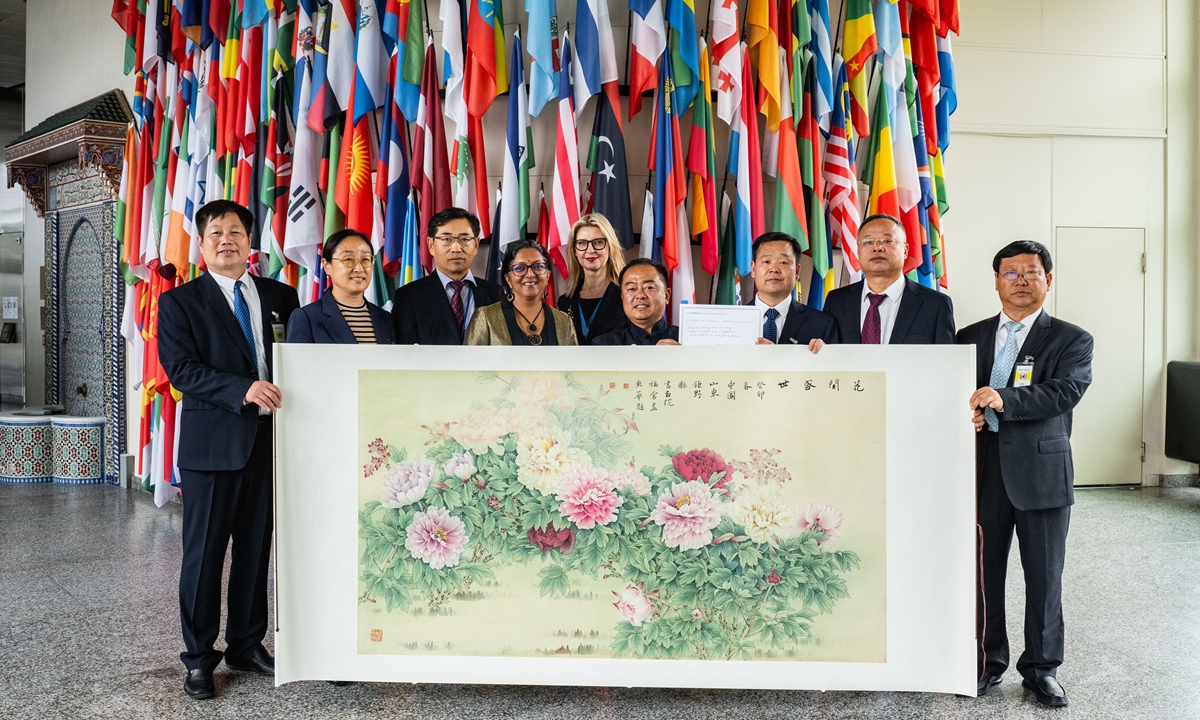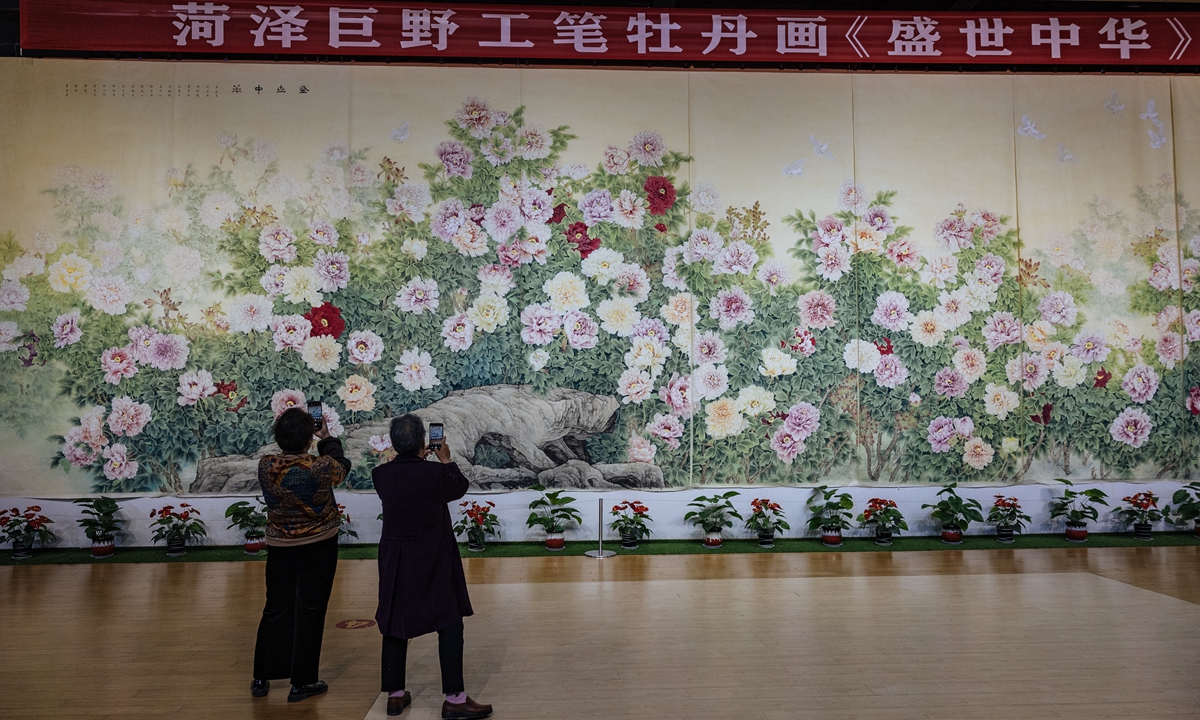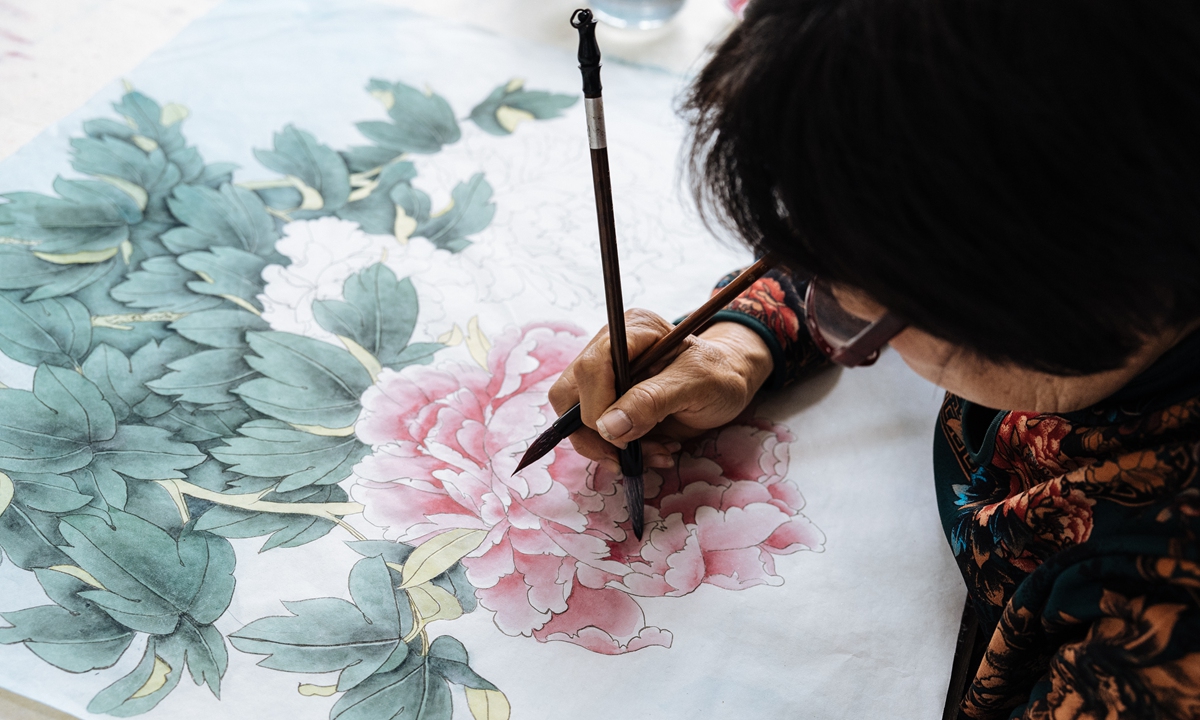
People pose for a group photo with a peony painting at the 2023 UN Chinese Language Day event in Vienna, Austria, on May 2, 2023. Photo: Courtesy of Juye Painting and Calligraphy Institute
The peony is widely seen as China's national flower. In Chinese culture, the flower is considered to be a symbol of good fortune and prosperity.
In Juye county, East China's Shandong Province, artists, many of them also farmers, paint traditional collaborative pictures of peonies to make a living.
The paintings from this small county are showcased not only in people's living rooms and offices, but also at key international events such as the Shanghai Cooperation Organisation (SCO) Qingdao Summit and the first China International Import Expo in Shanghai.
On May 2, the paintings, which represent the rich culture and history of Shandong, were on display at the 2023 UN Chinese Language Day event in Vienna, Austria.
Officials of the United Nations and international organizations praised the paintings by the artists from the Juye Painting and Calligraphy Institute.
The paintings were donated to the United Nations Office at Vienna, the United Nations Industrial Development Organization, the Comprehensive Nuclear-Test-Ban Treaty Organization and other international organizations as gifts representing hope for continued cultural exchanges.
"A beautiful painting, filled with lots of emotion. Our sincere thanks and appreciation to the artist for this kind gift and gesture," said a message left by Chetna Lakhoo-Verbeek, the director at the Division of Conference and Document Services under the International Atomic Energy Agency.
"We have much gratitude and appreciation for the richness of Chinese culture and language," said Ahed Sboul, chief conference management at the United Nations Office at Vienna.

Visitors enjoy a giant peony painting at the Juye Painting and Calligraphy Institute in Juye county, East China's Shandong Province, on April 30, 2023. Photo: Li Hao/Global Times
A fine tradition
Juye in Heze city, the home of peony flowers, is also the hometown of Chinese fine brushwork paintings and rural folk paintings.
The Juye Painting and Calligraphy Institute and Chinese Collaborative Peony Painting Research Institute are located here, which have played a leading role in promoting these art forms.
These paintings are an outstanding representative of Heze peony culture and pioneer exploring international markets on behalf of the Heze peony industry, Cheng Junwei, head of the Juye Painting and Calligraphy Institute, told the Global Times. They are also a beautiful business card representing Shandong's unique culture, he added.
On the basis of inheriting traditional Chinese painting techniques and combining them with modern technology, collaborative peony paintings in Juye are carefully crafted, neat and elegant. With rigorously drawn outlines and gorgeous colors, they fully depict the grace and luxury of the peony flower.
In June 2018, the giant painting Blossom in Prosperity created by Juye artists was showcased at the Qingdao International Convention Center during the 18th SCO Summit in Qingdao, Shandong.
Chinese President Xi Jinping and other world leaders posed for a group photo in front of the painting, which was then published on the front pages of many newspapers the next day. Russian President Vladimir Putin also hosted a press conference with the painting in the background during the event.

An artist works on a peony painting at the Juye Painting and Calligraphy Institute on April 30, 2023. Photo: Li Hao/Global Times
Boosting rural development
Besides professional artists in Juye, there are 49 grass-roots painting and calligraphy academies, and more than 20,000 people are engaged in painting and calligraphy industry-related work, Cheng told the Global Times.
Many of these artists come from a rural background, making them farmers who decided to pick up painting brushes.
Liu Chunxia, 46, is one of these farmer artists. When the Global Times met her in late April, she was painting in a classroom of at Juye Painting and Calligraphy Institute, which is located in a beautiful park in town.
Liu, mother of two college students, has qualified for an advanced peony painting class after years of study. Now painting has become her career.
There are many women painting at the institute, as well as in other grass-roots institutes across the county.
Engaging in peony painting not only allows rural women to stay at home with their children instead of seeking work elsewhere, but also provides an opportunity for them to discover their talent and gain a sense of self-worth.
This is especially significant for women who have not had access to education before.
Earlier in 2023, the local government launched a campaign to encourage more rural women to take up the career. Under the campaign, local institutes provide free training for farmers. Talented artists are recommended for advanced training.
Currently, more than 2,000 rural calligraphy and painting artists have been trained in various towns and communities in Juye.
After three to four years, the county's calligraphy and painting industry are expected to have a workforce of 100,000, which will help grow and strengthen the industry and inject new vitality into the area.



